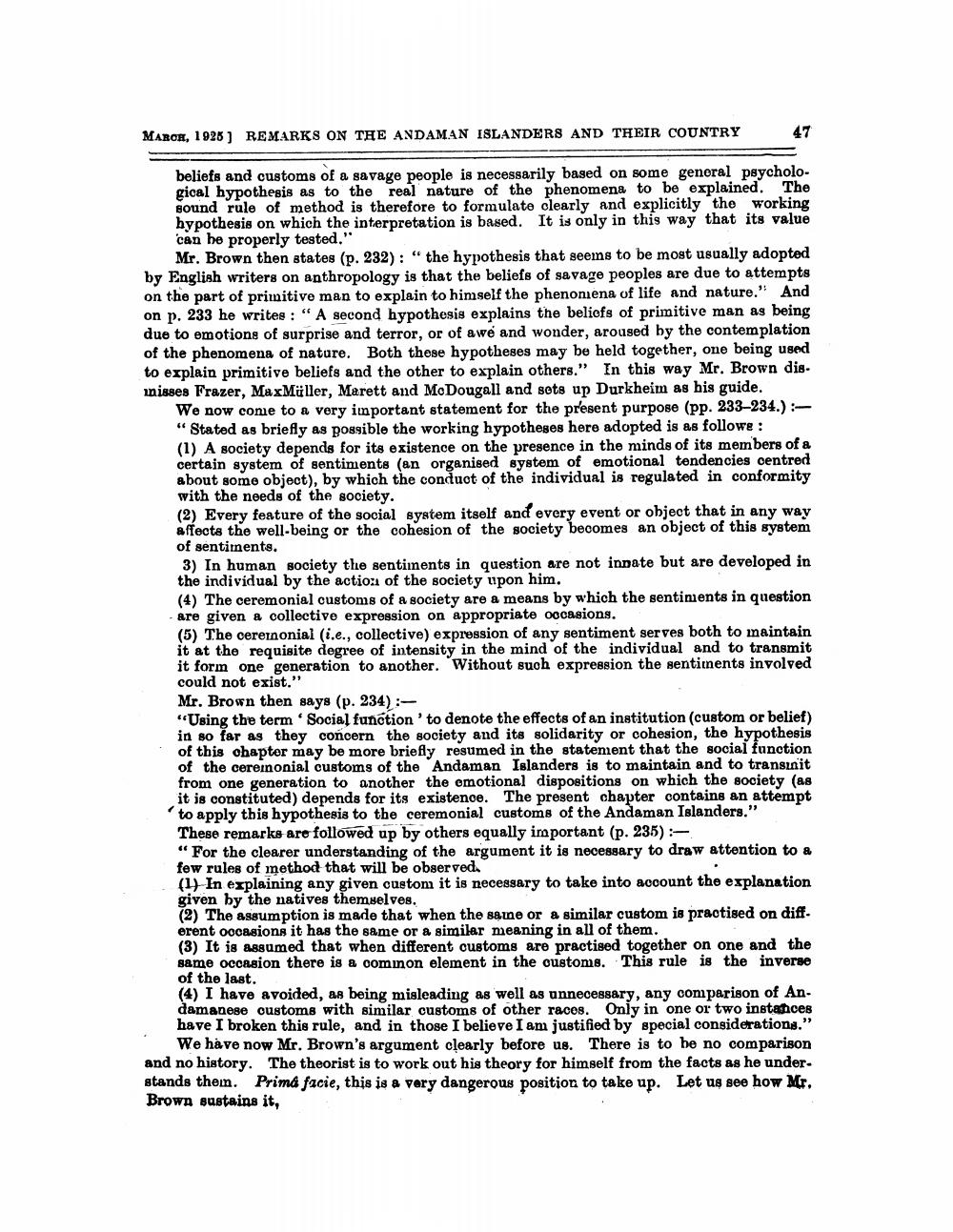________________
47
MARCH, 1925] REMARKS ON THE ANDAMAN ISLANDERS AND THEIR COUNTRY
beliefs and customs of a savage people is necessarily based on some general psychological hypothesis as to the real nature of the phenomena to be explained. The sound rule of method is therefore to formulate clearly and explicitly the working hypothesis on which the interpretation is based. It is only in this way that its value can be properly tested."
Mr. Brown then states (p. 232): "the hypothesis that seems to be most usually adopted by English writers on anthropology is that the beliefs of savage peoples are due to attempts on the part of primitive man to explain to himself the phenomena of life and nature." And on p. 233 he writes: "A second hypothesis explains the beliefs of primitive man as being due to emotions of surprise and terror, or of awe and wonder, aroused by the contemplation of the phenomena of nature. Both these hypotheses may be held together, one being used to explain primitive beliefs and the other to explain others." In this way Mr. Brown dismnisses Frazer, MaxMüller, Marett and McDougall and sets up Durkheim as his guide.
We now come to a very important statement for the present purpose (pp. 233-234.) :"Stated as briefly as possible the working hypotheses here adopted is as follows:
(1) A society depends for its existence on the presence in the minds of its members of a certain system of sentiments (an organised system of emotional tendencies centred about some object), by which the conduct of the individual is regulated in conformity with the needs of the society.
(2) Every feature of the social system itself and every event or object that in any way affects the well-being or the cohesion of the society becomes an object of this system
of sentiments.
3) In human society the sentiments in question are not innate but are developed in the individual by the action of the society upon him.
(4) The ceremonial customs of a society are a means by which the sentiments in question are given a collective expression on appropriate occasions.
(5) The ceremonial (i.e., collective) expression of any sentiment serves both to maintain it at the requisite degree of intensity in the mind of the individual and to transmit it form one generation to another. Without such expression the sentiments involved could not exist."
Mr. Brown then says (p. 234):
"Using the term 'Social function' to denote the effects of an institution (custom or belief) in so far as they concern the society and its solidarity or cohesion, the hypothesis of this chapter may be more briefly resumed in the statement that the social function of the ceremonial customs of the Andaman Islanders is to maintain and to transinit from one generation to another the emotional dispositions on which the society (as it is constituted) depends for its existence. The present chapter contains an attempt to apply this hypothesis to the ceremonial customs of the Andaman Islanders." These remarks are followed up by others equally important (p. 235):
"For the clearer understanding of the argument it is necessary to draw attention to a few rules of method that will be observed.
(1) In explaining any given custom it is necessary to take into account the explanation given by the natives themselves.
(2) The assumption is made that when the same or a similar custom is practised on diff. erent occasions it has the same or a similar meaning in all of them.
(3) It is assumed that when different customs are practised together on one and the same occasion there is a common element in the customs. This rule is the inverse of the last.
(4) I have avoided, as being misleading as well as unnecessary, any comparison of Andamanese customs with similar customs of other races. Only in one or two instances have I broken this rule, and in those I believe I am justified by special considerations." We have now Mr. Brown's argument clearly before us. There is to be no comparison and no history. The theorist is to work out his theory for himself from the facts as he understands them. Prima facie, this is a very dangerous position to take up. Let us see how Mr. Brown sustains it,




